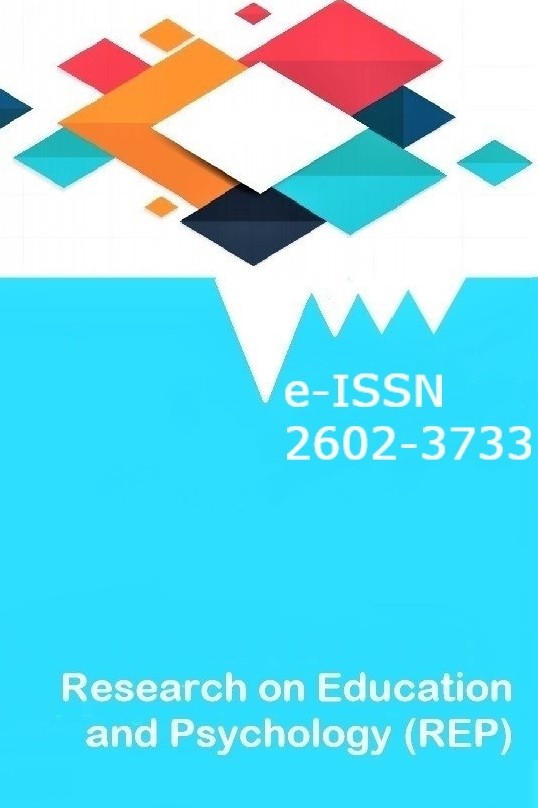Examination of the Contribution of Data Learning Field to the General Objectives of the Mathematics Teaching Program
Elementary Education, Mathematics Education, Data Learning Domain, Graphics, Education, Chart, Data learning area, Education, Elementary education, Math education
Examination of the Contribution of Data Learning Field to the General Objectives of the Mathematics Teaching Program
Mathematics Education, Chart, Data learning area, Education, Elementary education, Math education,
___
- Aktan, O. (2020). İlkokul matematik öğretim programı dersi kazanımlarının yenilenen Bloom taksonomisine göre incelenmesi [Investigation of Primary School Mathematics Curriculum Lesson Acquisitions According to Renewed Bloom Taxonomy], Pamukkale Üniversitesi Eğitim Fakültesi Dergisi, 48, 15-36.
- Alkan, H. (1999). Öğretmen Eğitiminde Çağdaş Yaklaşımlar Sempozyumu Açılış Konuşmaları [Contemporary Approaches in Teacher Education Symposium Opening Speeches ] [D.E.Ü. Buca Faculty of Education Journal, Special Issue. 11th.
- Altun, M. (2005). Matematik öğretimi [Mathematics teaching]. Aktüel Alfa Academy Publications.
- Altun, M. (2008). Eğitim fakülteleri ve sınıf öğretmenleri için matematik öğretimi. [Teaching mathematics for education faculties and primary teachers]. Aktüel Alfa Academy Publishing.
- Baki, A. (2015). Kuramdan uygulamaya matematik eğitimi [Mathematics education from theory to practice]. Ankara, Turkey: Harf Eğitim Publishing.
- Baykul, Y., (2012), İlkokulda matematik öğretimi [Teaching mathematics in primary school], Ankara : Pegem Akademi Publishing.
- Çepni, S. (2012). Araştırma ve Proje Çalışmalarına Giriş [Introduction to Research and Project Studies]. Trabzon: Celepler Printing.
- Dinç, S. (2021). Veri İşleme ve Olasılık Öğrenme Alanlarında Yapılan Lisans Üstü Tezlerin İncelenmesi (Yükse Lisans Tezi). [Analysis of Postgraduate Theses in Data Processing and Probability Learning Fields (Master’s Thesis)]. Elicited from the National Thesis Center of the Council of Higher Education. (Thesis No. 701982).
- Forsythe, L. (1997). Data Management and Analysis Elementary Level Ideas. Retrieved from http://mathcentral.uregina.ca/RR/database/RR.09.97/forsythe1.html
- Güven, B., Öztürk, T., & Özmen, Z. (2015). Ortaokul sekizinci sınıf öğrencilerinin istatistiksel süreçteki deneyimlerinin incelenmesi [Examining the statistical process experiences of 8th grade students]. Eğitim ve Bilim, 40(177), 343-363.
- İlhan, A., & Aslaner, R. (2019). 2005’ten 2018’e ortaokul matematik dersi öğretim programlarının değerlendirilmesi. [Evaluation of secondary school mathematics curriculum from 2005 to 2018]. Pamukkale University Journal of Education Faculty, 46(46), 394 – 415.
- Özel Kadılar, G., Ünal, C., Düz, Y. N., & Özkan, K. (2021). İstatistik öğretiminde yeni bir yaklaşım: doğada uygulamalı istatistik. [A new approach in teaching statistics: Applied statistics in nature]. Bilge International Journal of Science and Technology Research, 5(2), 124-138.
- Madisan Metropolitan School District Standarts. (2001). Mmsd K-5 mathematics content standards for data analysis and probability. US
- Merriam, S. B. (1998). Qualitative research and case study applications in education. San Francisco: Jossey-Bass Publishers.
- Miles, M, B., & Huberman, A. M. (1994). Qualitative data analysis: An expanded Sourcebook. (2nd ed). Thousand Oaks, CA: Sage.
- Ministry of National Education [MoNE]. (2009). Matematik dersi öğretim programı [Mathematics curriculum]. Millî Eğitim Bakanlığı [Ministry of Education], Ankara.
- Ministry of National Education [MoNE]. (2018). Matematik dersi öğretim programı [Mathematics curriculum]. Millî Eğitim Bakanlığı [Ministry of Education], Ankara.
- National Council of Teachers of Mathematics (1989). Curriculum and evaluation standards for school mathematics. Reston, VA: Author.
- National Council of Teachers of Mathematics. (2000). Curriculum and evaluation standards for school mathematics. Reston, VA: [NCTM],
- New Jersey Core Curriculum Content Standart. (2001). Clinton township school district annandale mathematics content standards. US.
- MEB. (2015). PISA 2012 survey national final report. General Directorate of Assessment, Evaluation and Examination Services, Ministry of National Education. https://pisa.meb.gov.tr/meb_iys_dosyalar/2020_12/23172540_pisa2012-ulusal-nihairaporu.pdf
- Seymour, D. (1996). Data: Kids, cats, and ads, statics. Dale Seymour Publications.
- Tosun, T. (2021). Ortaokul öğrencilerinin grafik algılarının ve grafik oluşturma yeterliklerinin incelenmesi (Yükse Lisans Tezi). [Investigation of graphic perceptions and graphic creation competencies of secondary school students (Master’s Thesis).] Elicited from the National Thesis Center of the Council of Higher Education. (Thesis No. 673167).
- Tosun, T. & Ünal, D. Ö. (2019). Veri ve olasılık öğrenme alanlarında yapılmış çalışmaların içerik analizi. [Content analysis of studies in data and probability learning fields]. Aegean Journal of Education, 20(1), 244-261.
- Yıldırım A, Şimşek H. (2013). Sosyal bilimlerde nitel araştırma yöntemleri. [Qualitative research methods in the social sciences]. Ankara: Seçkin Publishing.
- Yin, R. K. (2003). Case study research: Desigin and methods. Thousand Oaks, CA: Sage.
- Yayın Aralığı: Yılda 4 Sayı
- Başlangıç: 2017
- Yayıncı: Bülent DİLMAÇ
Analysis of the Scientific Research on Inclusive Education
A Review of New Istanbul B1 Level Textbook Writing Activities
Ezgi KOCAMANGİL YILDIRIM, Burcu ŞENTÜRK
Fadim Büşra KELEŞ, Şahin KESİCİ, Mehmet AK
Opinions of Pre-service Elementary School Mathematics Teachers on Misconceptions
Semiha KULA ÜNVER, Aysun Nüket ELÇİ
The Relationship between Mathematics Anxiety and Mathematics Achievement: Meta Analysis Study
Hakan ULUM, Tuncay KÜÇÜKDANACI
EFL students’ Language Needs Assessment in Private General English Classes
